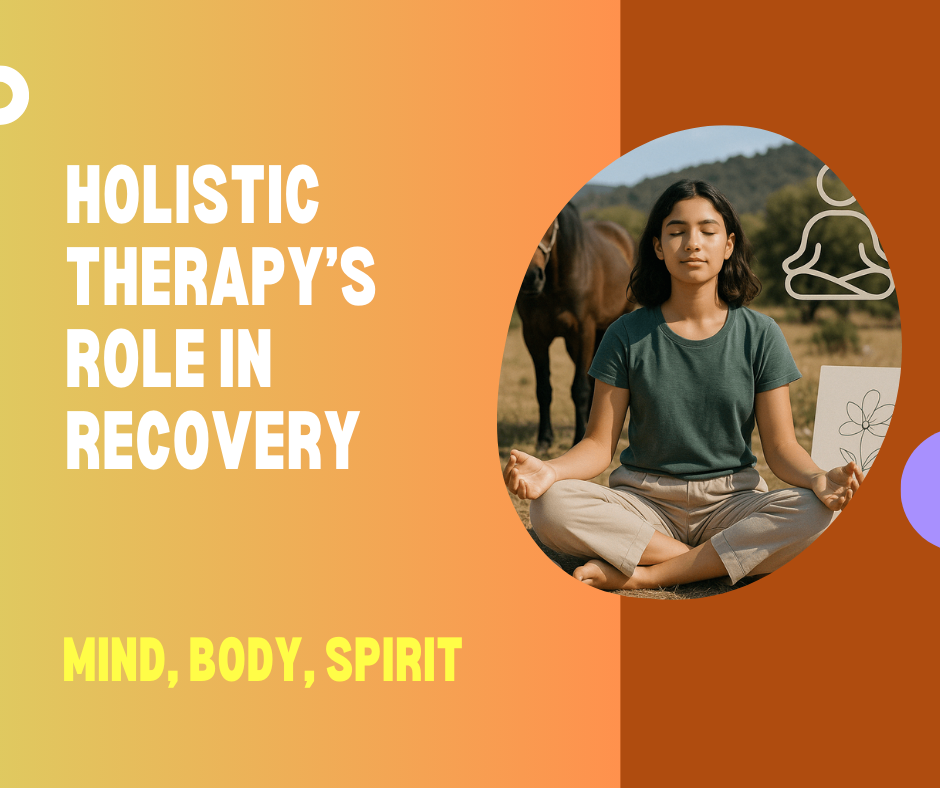
Arizona’s Individualized Programs for Teen Mental Health

Imagine if every teen received the compassionate, personalized care they deserve—this is the future we can create together. Teen mental health issues in Arizona need focused, personalized care. The statistics tell a concerning story – many young people struggle silently with conditions that respond best to treatment designed specifically for them. This isn’t about generic solutions but about recognizing that each teen faces unique challenges requiring individualized approaches. At Horizon Recovery, our tailored programs offer hope and personalized care for Arizona’s teens.
When addressing serious issues like PTSD, depression, anxiety, or suicidal thoughts, one-size-fits-all treatments often fall short. Let’s explore how individualized mental health programs in Arizona are making a difference for teens and their families.
Understanding Teen Mental Health Challenges in Arizona
Arizona teens face significant mental health challenges. According to the Arizona Department of Health Services’ 2024 Adolescent Mental Health Report, Arizona teens are facing unprecedented challenges that underscore the need for individualized care. About 16.90% of youth in Arizona experience mental health challenges – that’s approximately 96,000 young people.
Even more troubling, 57.8% of teens aged 12-17 with depression went untreated last year in Arizona. High school students with depression are over twice as likely to drop out compared to their peers. Additionally, recent CDC 2024 Youth Risk Behavior Survey data highlights both improvements in some areas and persistent challenges, reinforcing the need for tailored interventions.
These statistics highlight why generic approaches often miss the mark. Each teen’s experience with mental health is shaped by their personal history, family dynamics, social environment, and biological factors unique to them.
Why Individualized Teen Mental Health Treatment Programs in Arizona are Essential
Individualized treatment means creating a care plan that addresses the specific needs, strengths, challenges, and goals of each teen. This contrasts sharply with standardized approaches that apply the same techniques to everyone regardless of their unique situation.
Traditional treatment often follows preset protocols based on diagnosis alone. But individualized care considers the whole person – their personality, interests, learning style, family dynamics, cultural background, and personal goals.
For teens dealing with complex issues like self-harm or suicidal thoughts, this personalized approach becomes even more critical. These behaviors often stem from multiple underlying factors that vary greatly from person to person.
The Framework of Individualized Teen Mental Health Treatment Programs in Arizona
Effective individualized programs start with a comprehensive framework that allows for customization while maintaining clinical excellence. These programs typically include:
- Thorough initial assessments that evaluate mental, physical, and social factors
- Collaborative treatment planning involving the teen, family, and clinical team
- Regular reassessment and plan adjustment
- Integration of various therapeutic approaches based on individual needs
- Consideration of cultural, environmental, and developmental factors
Teen treatment programs that follow this framework can address the full spectrum of a teen’s needs rather than focusing narrowly on symptom management.
Step-by-Step Treatment Process
The journey through individualized treatment typically follows these steps:
- Comprehensive Assessment: This goes beyond basic diagnosis to understand the teen’s complete history, strengths, challenges, and goals.
- Collaborative Planning: The clinical team works with the teen and family to develop a treatment plan that addresses immediate concerns while building toward long-term wellness.
- Implementation: Treatment begins with carefully selected therapeutic approaches matched to the teen’s specific needs.
- Ongoing Monitoring: Regular check-ins and assessments track progress and identify any need for adjustments.
- Adaptation: The treatment plan evolves based on the teen’s response and changing needs.
- Transition Planning: As treatment progresses, plans for maintaining progress and preventing relapse are developed.
This process ensures that care remains responsive to the teen’s changing needs throughout their recovery journey.
Evidence-Based Therapeutic Approaches
Individualized programs draw from a range of evidence-based therapies, selecting those most likely to benefit each teen:
Cognitive Behavioral Therapy (CBT) helps teens identify and change negative thought patterns that contribute to mental health problems. For teens struggling with anxiety or depression, CBT can be particularly effective.
Dialectical Behavior Therapy (DBT) combines acceptance and change strategies, teaching skills for emotional regulation, distress tolerance, interpersonal effectiveness, and mindfulness. This approach works well for teens dealing with intense emotions, self-harm behaviors, or suicidal thoughts.
Trauma-focused therapies address the impact of traumatic experiences on a teen’s mental health. These approaches help teens process traumatic memories and develop healthier coping mechanisms.
Learn more about our Family Therapy services, which recognize the crucial role of family dynamics in teen mental health. By involving parents and siblings in treatment, these approaches strengthen the support system around the teen.
Local Expertise: Clinical Experts in Arizona
Meet Horizon Recovery’s Expert Clinicians—leaders in individualized teen mental health treatment programs in Arizona—whose innovative, tailored approaches are transforming young lives. Founded by Brian Carlisle, FNP-C, Horizon Recovery combines clinical excellence with compassionate care to address the unique needs of each teen we serve.
Our clinical teams include psychiatrists, psychologists, licensed therapists, social workers, and other specialists who collaborate to address each teen’s needs. Many have advanced training in adolescent development, trauma treatment, and crisis intervention.
These professionals stay current with the latest research and treatment approaches, bringing evidence-based practices to their work with teens. Their expertise allows them to recognize subtle signs of improvement or concern that might be missed in less specialized settings.
Collaboration with Local Institutions
Effective teen mental health care extends beyond the treatment center through partnerships with:
- Schools, to support academic progress during treatment
- Primary care providers, for coordinated physical and mental health care
- Community organizations, for additional support services
- Crisis response teams, for emergency intervention when needed
These collaborations create a network of support that reinforces the individualized treatment plan and helps teens apply new skills across different settings.
Success Stories and Testimonials
The impact of individualized treatment is best illustrated through real experiences. While protecting privacy, many programs share anonymized success stories that demonstrate the effectiveness of personalized approaches.
For example, teens who entered treatment with severe depression and suicidal thoughts have gone on to develop effective coping skills, rebuild relationships, and return to academic success. Parents often report that individualized treatment provided the breakthrough their family needed after trying multiple standard approaches without success.
These stories highlight how treatment tailored to each teen’s unique situation can achieve results that seemed impossible with one-size-fits-all approaches.
How to Access Individualized Teen Mental Health Treatment Programs in Arizona
Finding the right program starts with understanding the options available. In Arizona, teens can access mental health care through:
- Residential treatment programs for teens needing 24-hour support
- Intensive outpatient programs (IOP) that provide structured treatment while teens live at home
- Outpatient services for ongoing support and therapy
- School-based services that provide care in educational settings
The intake process typically begins with a phone call to discuss concerns and gather basic information. This is followed by a comprehensive assessment to determine the most appropriate level of care and begin developing an individualized treatment plan.
Practical Steps for Parents and Caregivers
If you’re concerned about your teen’s mental health, consider these steps:
- Document concerning behaviors, including when they occur and how long they last
- Talk with your teen openly about your concerns, focusing on support rather than judgment
- Consult with your teen’s primary care provider for an initial assessment and referrals
- Research treatment options, looking for programs that emphasize individualized care
- Contact programs directly to learn about their approach and assessment process
- Check insurance coverage and ask about financial assistance options
When speaking with mental health professionals, ask specific questions about how they individualize treatment and involve families in the process. This will help you find a program that truly tailors care to your teen’s needs.
Addressing Specific Mental Health Concerns
Individualized treatment programs adapt their approaches based on each teen’s specific challenges:
For teens with PTSD and trauma, treatment focuses on creating safety, processing traumatic experiences at an appropriate pace, and developing healthy coping skills. Approaches might include trauma-focused CBT or EMDR therapy.
Teens struggling with anxiety disorders benefit from exposure therapy, cognitive restructuring, and relaxation techniques tailored to their specific triggers and symptoms.
Depression treatment often combines therapy approaches with careful medication management when appropriate, along with lifestyle interventions matched to the teen’s interests and strengths.
For teens experiencing self-harm behaviors or suicidal thoughts, safety planning is paramount, followed by intensive skills training to manage emotional distress. Helping a suicidal teen requires immediate intervention followed by comprehensive treatment.
Empower Your Teen with Individualized Teen Mental Health Treatment Programs in Arizona
Experience the transformative impact of individualized teen mental health treatment programs in Arizona—reach out today. Your teen’s journey to better mental health doesn’t have to follow anyone else’s path. With individualized treatment, they can receive care that’s as unique as they are, giving them the best chance for lasting recovery and growth.
Take the first step by contacting Horizon Recovery today at our contact page for a personalized treatment consultation. Don’t wait until it’s too late. Empower your teen with a treatment plan as unique as they are.
More posts like this
.svg)
Guiding your teen’s path to mental clarity, sobriety, and a hopeful future.
For more information or to schedule a visit, please reach out to us today. Our empathetic and caring team is here to support you every step of the way.
.svg)
.avif)
.svg)
.svg)



